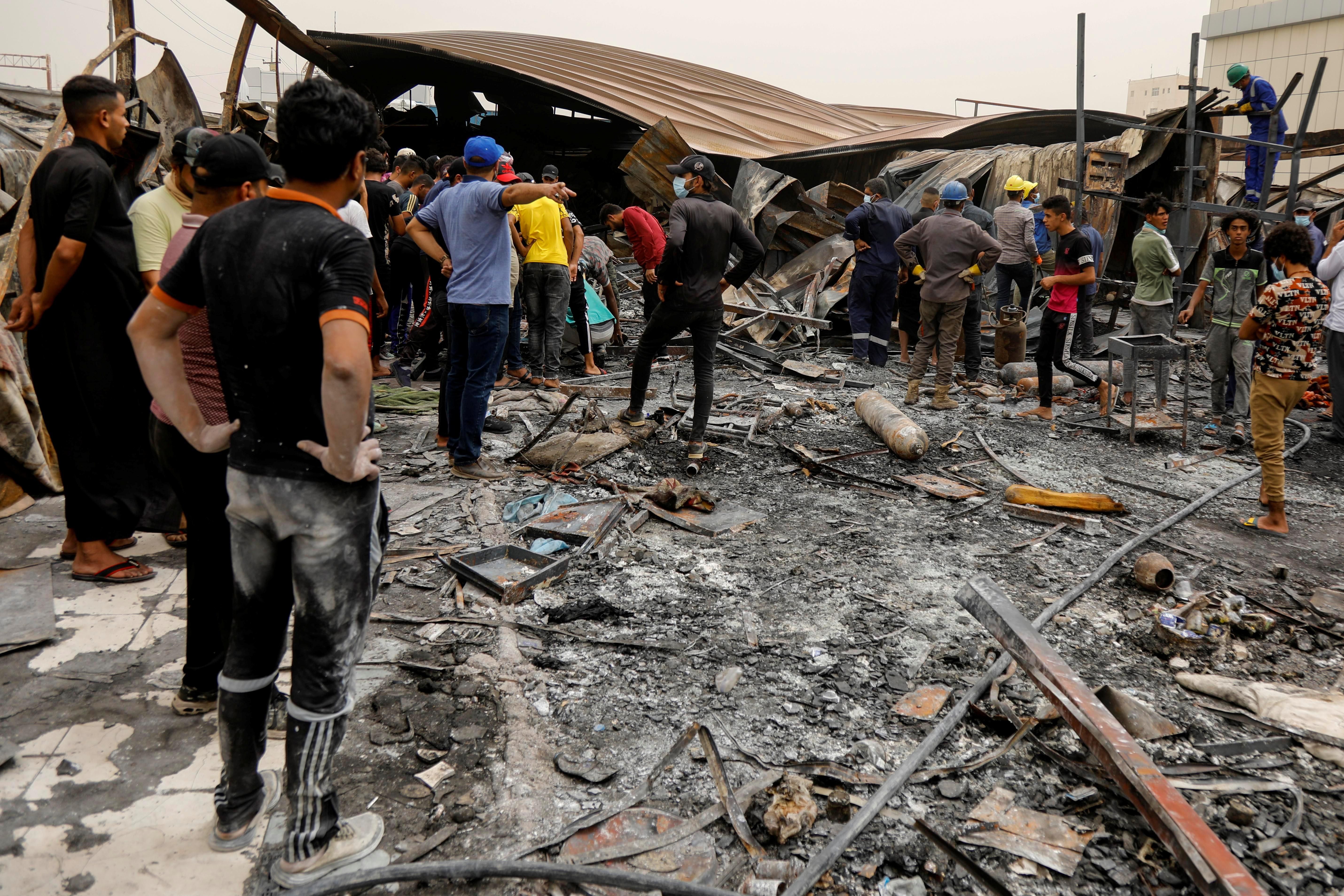News
July 13, 2021
Iraqi COVID ward burns: Clashes broke out Monday between police and relatives of patients at the al-Hussein hospital in Nasiriyah (Iraq's fourth largest city) who were killed when a fire broke out in the COVID-19 isolation ward. At least 92 people died, and dozens were injured when a the shoddy ward, constructed a few months ago to manage the growing COVID outbreak, became ablaze. (Iraq's Health Ministry has still not confirmed the cause of the fire.) This disaster comes as the COVID crisis has severely strained the country's already-feeble healthcare system, leading to more than 1.4 million infections and at least 17,000 COVID deaths nationwide (likely a gross undercount). Monday's blaze comes months after a deadly fire at a Baghdad hospital killed at least 82 people. Prime Minister Mustafa al-Kadhimi has ordered the suspension and arrest of health and defense officials in Nasiriya, but it's unclear whether this move will be enough to placate furious Iraqis who are rising up after years of neglect, economic stagnation, war, and now a pandemic. Indeed, many Iraqis who have hit the streets in recent months are asking a simple question: what do we have to lose? Only 2.5 percent of the Iraqi population has received one dose of COVID vaccine.
EU's Mozambique mission: The EU said Monday that it will establish a new military mission in Mozambique to help the government push back against an increasingly brazen Islamic insurgency that's taken over large swaths of territory in the country's northeast. Portugal, Mozambique's former colonizer, is already training Mozambican troops and will head the mission on the ground. Like the EU operation launched in Mali in 2013, European troops will train soldiers and help rebuild infrastructure, but they will not engage in combat missions. It's unclear whether the 27-member bloc will send military equipment. For more than three years, fighters belonging to the al-Shabaab militant group that claim loose ties to the Islamic State have waged a brutal insurgency in Cabo Delgado province that has killed thousands and displaced more than 700,000 people. Earlier this year, US Special Forces soldiers began training Mozambican troops as part of an effort to quash the insurgency in the country's northeast.
Will Bulgaria have a punk-rock PM? With around 99 percent of votes counted from Sunday's national election in Bulgaria, former punk-rock front man and TV personality Slavi Trifonov, who fashions himself as "anti-politics," is favored to head Bulgaria's next government. So far, Trifonov's There Is Such a People party has won 23.9 percent of the vote, just 0.2 percentage points ahead of former prime minister Boyko Borisov's conservative GERB party. Trifonov, who says he will only sit in government with specific protest parties, says he will not try to form a coalition, but will instead head a minority government. The former pop star, who has no real political agenda and did no real canvassing prior to the polls, says he is not courting groups like the anti-corruption group Stand Up! Mafia Out! that emerged from last year's rallies against the corruption plagued Borisov government. Given the slim margin, analysts say that another election cannot be ruled out, which would be Bulgaria's third in 2021. Either way, this result is likely to signal the end of Borisov's years-long grip on power, an era characterized by successive corruption scandals and allegations of ties to organized crime groups. (For your amusement, here is Trifonov rocking it out with the Ku ku band, circa 2011.)
More For You
Bad Bunny during the Super Bowl LX halftime show press conference at Moscone Center.
Kirby Lee-Imagn Images
100 million: The number of people expected to watch the Super Bowl halftime performance with Bad Bunny, the Puerto Rican superstar and newly minted Album of the Year winner at the Grammys.
Most Popular
Think you know what's going on around the world? Here's your chance to prove it.
- YouTube
An imminent US airstrike on iran is not only possible, it's probable.
Americans are moving less — and renting more. Cooling migration and rising vacancy rates, especially across the Sunbelt, have flattened rent growth and given renters new leverage. For many lower-income households, that relief is beginning to show up in discretionary spending. Explore what's changing in US housing by subscribing to Bank of America Institute.
© 2025 GZERO Media. All Rights Reserved | A Eurasia Group media company.
